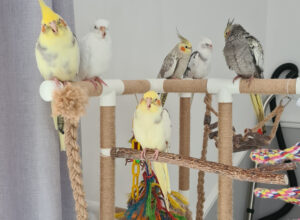Training Cockatiels: Basic Commands
Key Takeaways
- Cockatiels are highly social birds that require regular interaction.
- Creating a stimulating environment is essential for their well-being.
- Pairing cockatiels or ensuring daily human interaction can prevent loneliness.
- Understanding and responding to their communication cues is vital.
- Regular health check-ups and a balanced diet contribute to their social happiness.
I’ve learned firsthand the joy these feathered friends bring into our lives. Not only are they beautiful and entertaining, but their social needs provide a unique opportunity for us to connect with the natural world right in our living rooms.
Introduction
Cockatiels, native to the semi-arid regions of Australia, are known for their friendly and affectionate nature. However, their social instincts mean they require significant attention and interaction to thrive. Ignoring these needs can lead to stress, behavioural issues, and even health problems. Therefore, understanding and catering to their social requirements is paramount for any cockatiel owner.
The Importance of Companionship
Cockatiels are flock animals by nature, which means they are used to constant companionship. In the wild, they are rarely alone, so as pet owners, it’s our responsibility to ensure they don’t feel isolated.
Human Interaction: Daily interaction with your cockatiel is essential. This can include talking to them, allowing them out of their cage to explore safely under supervision, and training sessions which can also strengthen your bond.
Feathered Friends: If possible, consider getting another cockatiel. Having a companion of their species can help fulfill their social needs more naturally. However, ensure both birds are compatible and introduced to each other gradually to avoid any territorial disputes. Don’t forget, housing a male and female cockatiel together could result in mating.
Communication is Key
Cockatiels communicate through a variety of sounds and body language. Recognising and responding to these cues can significantly enhance your relationship. For instance, a cockatiel that whistles or sings is often content, while hissing or retreating indicates discomfort or fear.
Enriching the Environment
An enriched environment is crucial for a cockatiel’s mental and social health. This includes:
- Variety of Toys: Provide a selection of toys to keep your bird entertained, including puzzles that encourage problem-solving.
- Regular Cage Rotation: Change the layout of their cage regularly to provide new stimuli.
- Safe Spaces: Ensure they have safe spaces within their cage where they can retreat if they feel overwhelmed.
The Role of Diet and Health
A balanced diet and regular veterinary check-ups are crucial for your cockatiel’s overall well-being, which in turn affects their social behaviour. Ensure they have access to a variety of nutritious foods and clean water. Regular health check-ups can prevent diseases that could affect their mood and sociability.
Tables for Better Understanding
Signs of a Happy Cockatiel vs. Signs of Stress
| Happy Cockatiel | Stressed Cockatiel |
|---|---|
| Singing/Whistling | Feather Plucking |
| Curious and Active | Aggression |
| Eating Well | Loss of Appetite |
| Regular Preening | Constantly Fluffed Up |
Daily Interaction vs. Environmental Enrichment
| Daily Interaction | Environmental Enrichment |
|---|---|
| Talking and Singing | Variety of Toys |
| Training Sessions | Regular Cage Rotation |
| Supervised Exploration | Safe Spaces |
Concluding Thoughts
Caring for a cockatiel requires a deep commitment to understanding and fulfilling their social needs. By providing daily interaction, a stimulating environment, and proper care, you can ensure your feathered friend leads a happy and healthy life. Remember, the key to a thriving cockatiel is not just about meeting their physical needs but nurturing their social well-being too.
As we journey together with our cockatiel companions, let’s embrace the opportunity to create a bond that enriches both our lives and theirs. After all, the love and laughter a cockatiel brings into a home are truly unmatched.
I love my flock, which started with one male Buddy and I’m currently up to six! have I stopped at six? Hmmm that’s another question!
Further Reading
For more detailed guidance on cockatiel care, consider exploring the following resources:
- Essential Cockatiel Care
- Setting Up a Cockatiel Cage
- Cockatiel Feeding Basics
- Understanding Cockatiel Behaviour
- Daily Cockatiel Care
These resources provide comprehensive insights into various aspects of cockatiel care, from setting up their living environment to understanding their unique behaviours. Remember, a well-cared-for cockatiel is a sociable and joyful companion, making the effort truly worthwhile.

